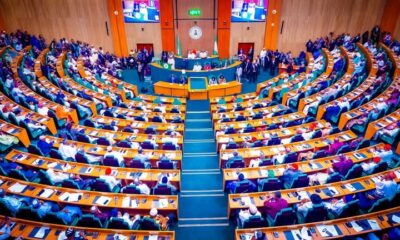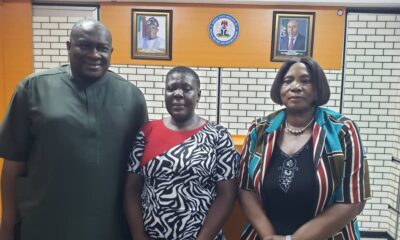Business
Stakeholders Fault FG’s Border Re-Opening For Dangote, BUA

Trade and industry stakeholders have said that the reported re-opening of land borders to allow Dangote and BUA companies to trans ship their goods across the closed borders was lopsided and amounted to a ‘selective decision’ that would engender monopolies.
Key stakeholders made this assertion in a communique issued yesterday after a Webinar and physical “Stakeholders’ Review Meeting on the Recommendations of the Policy Dialogue on Border Closure and Matters Arising”.
The consultative meeting was organised by the National Association of Nigerian Traders (NANTS) in collaboration with GIZ SEDIN-NICOP programme.
The communique, signed by NANTS President, Dr Ken Ukaoha, noted that the selective re-opening contradicted enshrined general principles and provisions of the recently enacted Federal Competition and Consumer Protection Commission (FCCPC) Act, signed by President Muhammadu Buhari.
Ukaoha also frowned at the continued closure of land borders, saying it contradicted the principles of Ease of Doing Business, a commendable strategy on trade facilitation, which the present administration had been vigorously pursuing.
He said while some operators had noted the implications of the action to the economy, especially within the context of the nation’s present status of economic recession, others complained of the inaction concerning goods stranded at the borders, since the border closure.
The NANTS president said it also negated and diminished the essence of all financial facilities, incentives and palliatives to MSMEs, including the recent N75 billion MSMEs COVID-19 Survival fund, which the Federal Government had pumped into the system for increased productivity.
“Increased productivity cannot happen without adequate market access opening for originating products to draw from the available ECOWAS market share, for which Nigeria should naturally remain the lead beneficiary,” he said.
“Ultimately, this results in furthering inflation, increase in prices of essential commodities, which would erroneously be blamed on the traders and other private sector operators.
“We call on government for the immediate re-opening of the land borders to all genuine businesses, and deploying security, employing intelligence sharing, surveillance tactics and trade facilitation lessons learnt during the border closure for effective policing and regulation of the borders and corridors.
“This will encourage unhindered movement of genuine goods to enhance food security and livelihoods,” Ukoaha said.
According to him, the continued closure of the borders may increase the devastating food and revenue shortages caused by COVID-19 and compounded by the effects of insecurity, flooding, and other climate change related challenges, on the nation’s food security agenda.
Ukaoha commended the Federal Government for considering the re-opening of land borders after a protracted closure dating back to Aug. 20, 2019, noting that such re-opening would send the right signal to genuine business actors in Nigeria, the entire ECOWAS business community, as well as community citizens on ease of movement.
Business
Lokpobiri Condemns Abandoned Refinery Project in N’Delta … Vows Revival
Business
FG Unveils Industrialisation Strategies In 2025 … To Conduct MSMEs Census
Business
Coy Strengthens Commitment To Nigeria’s Energy Future
-
Rivers5 days ago
Bonny Protest Neglect, Seeks CSR MoU Implementation
-
Nation5 days ago
FG Begins Tolling On Abuja-Keffi-Akwanga-Makurdi Highway
-
Rivers3 days ago
Dep Gov Hails LG Boss Over Development … Says ONELGA’ll Always Stand With Fubara
-
Business5 days ago
NDYC Seeks NDDC Commercialisation … Uncompleted Projects Completion
-
News3 days ago
OBJ’s ADC, Jemitola, Slumps, Dies At IBB Golf Club
-

 Featured3 days ago
Featured3 days agoReps Propose Creation of 31 New States
-

 Rivers5 days ago
Rivers5 days agoCommissioner Promises Improved Working Conditions … Splashes N.1m On Outstanding Caregiver
-
Sports5 days ago
Sports: 2nd Edition Of Inter-Tribal Tourney Kick-starts In Mbiama

